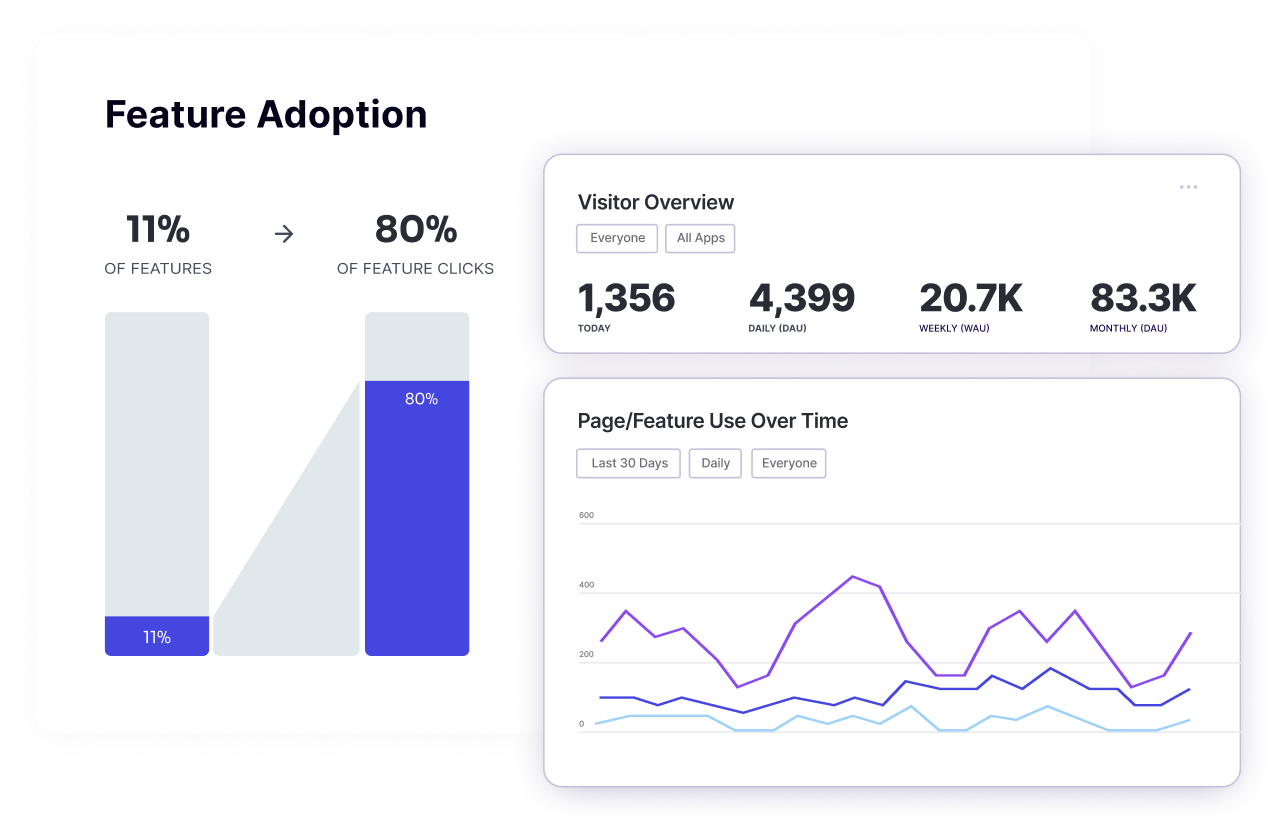How does your product stack up?
The best product teams use data to drive decisions. But knowing how their product performance stacks up against their peers has eluded even the most sophisticated product managers. Use these benchmarks to measure your digital product's performance against both peers in your industry and top performers.
Methodology
In this tool, we analyzed aggregated and anonymized product data from 6,800+ applications across 2,500 Pendo customers.
We’ve explored nine strategic KPIs, broken down by benchmarks for low (25th percentile), median (50th), high (75th), and best-in-class (90th) performance.
You can view the results organized by region, company size, and industry for personalized, relevant benchmarks—whether you’re responsible for product at an early stage startup or a global enterprise.
We’ve explored nine strategic KPIs, broken down by benchmarks for low (25th percentile), median (50th), high (75th), and best-in-class (90th) performance.
You can view the results organized by region, company size, and industry for personalized, relevant benchmarks—whether you’re responsible for product at an early stage startup or a global enterprise.
Let's get started
How would you like to view each benchmark?
By region:
By company size:
By industry:
Monthly active user growth
The percentage change in the number of active users coming to your product, month over month
Monthly active user (MAU) growth measures how successful your product is attracting users, each month.
How we calculated the active user growth benchmark
For all companies of all sizes in all regions,
best-in-class products have a monthly active user (MAU) growth rate of 75%
What is your product's monthly active user growth rate?
Next up
Funktionsakzeptanz
Funktionsakzeptanz
Percentage of features that generate 80% of click volume
By understanding how (or if) customers adopt and use your product, you’ll have a clear sense of whether the product is delivering on its intended value. The more features a user adopts, the more value they receive, and the less likely they are to churn. One common way to track feature adoption is by the percentage of features that generate 80 percent of click volume.
For all companies of all sizes in all regions,
best-in-class products have a feature adoption rate of 30%
What percentage of features generate 80% of click volume in your organization?
Next up
Benutzerbindung
Benutzerbindung
How many users return to your product over time
Since product usage data is most valuable when measured over time, user retention measures how many people continue using an application during a given time period. User retention is one of the most important measures of how successfully you’re engaging your user base.
How we calculated user retention
For all companies of all sizes in all regions,
best-in-class products have a 3-month retention rate of 30%
Next up
Stickiness
Stickiness
How many users return to your product on a regular basis
We all want to build software that not only attracts new users, but ensures those users stick around and continuously engage with the product. Stickiness helps you quantify how frequently users return and can provide valuable insight that you can use to drive higher engagement across your user base.
How we calculated the stickiness benchmark
For all companies of all sizes in all regions,
best-in-class products have a stickiness of 5%
What is your daily active user rate?
Next up
Time to value
Time to value
How quickly users begin to use key features in your product
Time to value is an activation metric that shows how quickly users learn about and begin to use key features in your product that deliver value. Many refer to the latter point as the “aha” moment—when a user has a clear grasp of why they need a specific application. Users who find your product valuable early on are more likely to stick around longer.
How we calculated the time to value benchmark
For all companies of all sizes in all regions,
best-in-class products have a time to value of 1.3 days
What is your average time to first use of your most-used product feature? (time in days)
Next up
Time on app
Time on app
How much time users spend with your product
Time on app is an engagement metric that shows how much time on average users spend with your product. The more time users spend with your app (and the faster they get value from it), the more likely they are to continue using your product, and the less likely they are to churn.
How we calculate time on app
For all companies of all sizes in all regions,
best-in-class products have an avg. daily time per visitor per app of 5 minutes
What is your average time on app in minutes?
Next up
Guide engagement
Guide engagement
How users interact with in-app guides
Guide engagement rate measures how users interact with the in-app guides within your product. Interactions can include page views, clicks, and other key actions a user can take that indicate they’re getting value from your in-app communications.
How we calculated guide engagement rate
For all companies of all sizes in all regions,
best-in-class products have a guide engagement rate of 10%
What is your product's guide engagement rate?
Next up
NPS response rate
NPS response rate
Percentage of users that complete your NPS survey
Net Promoter Score (NPS) measures how likely customers are to recommend a product or service. NPS response rate is the percentage of users that actually complete the NPS survey. The more responses you have to an NPS survey, the more insights you have to make data-driven decisions about your product roadmap.
How we calculated NPS response rate
For all companies of all sizes in all regions,
best-in-class products have an NPS response rate of 10%
What is your product's NPS response rate?
Next up
Product engagement score
Product engagement score
How users are engaging with your product overall
Product engagement score (PES) is a Pendo metric that provides a single metric to measure how users or customers engage with the product. PES in Pendo is a composite metric, taking the average of one’s adoption, stickiness, and growth rates. The goal? To make it easy to quickly understand how your product is performing.
For all companies of all sizes in all regions,
best-in-class products have a PES of 54
What is the average product adoption, stickiness, and growth rates?
Download the Mind the Product benchmarks report to get the key findings from our 2024 analysis and understand where your business stands in the competitive landscape.
Explore your product data with Pendo
Pendo provides the data to help you get closer to your users, scale onboarding and support, increase adoption, and optimize your software experiences.
Jetzt starten



 How to find your MAU growth in Pendo
How to find your MAU growth in Pendo